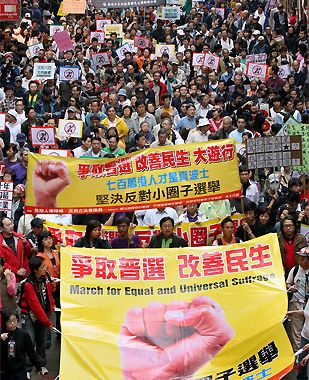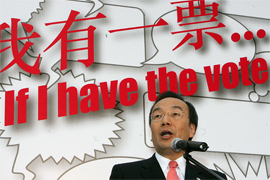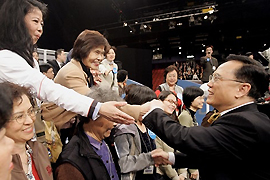HK set for first contested vote
Pro-democracy candidate signals shifting political landscape.

Published On 23 Mar 2007
Leong, the challenger, is under no illusions that he has any chance of winning and has already said he is “not in it to get the job”.
Nonetheless, he says, his campaign signals a shift in Hong Kong’s political landscape.
“I am in to establish an election culture,” he told a local magazine in the week before the vote.
‘One country, two systems’
Since Hong Kong returned to Chinese rule in 1997, the territory has been ruled under the principle of “one country, two systems” which gives it a significant degree of autonomy from the mainland.
But regular displays of political muscle-flexing by Beijing have worried democrats who fear that promises of greater democracy in the future are little more than empty words.
In 2004, for example, the Chinese government ruled that Hong Kong would have to obtain approval from Beijing to make changes to its electoral laws, including moves towards the direct election of its leader.
Martin Lee, a leading Hong Kong democrat, has described the 2004 ruling as Hong Kong’s “darkest hour”.
Road map
Tsang says he favours an open democratic system for Hong Kong, and says he will deliver a full road map for democracy if – as is virtually certain – he is picked to serve a second term as chief executive.
 |
| Alan Leong says he is looking to change Hong Kong’s election culture [AFP] |
“We all want to achieve universal suffrage as soon as we possibly can,” he said in a pre-election briefing.
But he said Hong Kong should be allowed to decide on its own what is the best system for the territory.
“I am not doing it because someone badgers me to do it from elsewhere,” he said.
Under article 45 of Hong Kong’s post-handover constitution, known as the Basic Law, the selection of the chief executive by universal suffrage should be the “ultimate aim”.
But the document lays down no timescale as to when that should happen.
Reform
In the decade since the handover, Hong Kong has proved wrong the doubters who said the transition to Chinese rule would spell the end of its wealth and power.
Instead the territory’s booming economy has bounced back from recession and the impact of the SARS virus, backed up by a respected rule of law and one of Asia’s most corruption-free administrations.
At the same time Hong Kong has seen growing calls for reform and greater democracy.
 |
| Incumbent Donald Tsang has promised to produce a road map to democracy [AFP] |
For pro-democracy campaigners the watershed moment came on July 1, 2003 when half a million people marched through the city in protest against the then chief executive, Tung Chee-hwa, and proposed anti-subversion laws.
The laws were eventually scrapped and Tung himself eventually resigned his post in March 2005.
Now, for the first time, an opposition candidate has gained the required backing of at least 100 members of the electoral college to get his name on the ballot.
In the run up to Sunday’s vote, Tsang and Leong have both been out on the stumps, laying out their policies for Hong Kong’s future and even engaging in two televised debates.
That has given the election of Hong Kong’s chief executive – normally little more than a bureaucratic formality – at least some of the flavour of an actual political campaign.
Source: Al Jazeera, News Agencies